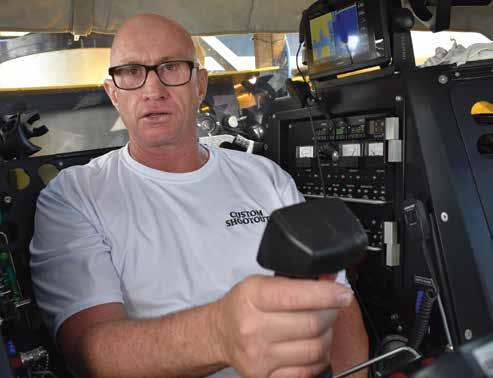Yachting can set you up for life financially, if you do it right Editor’s note: Bosun Alex Kempin has written about finances for yacht crew for The Triton since May. Below are snippets of a few of his columns. To read these full columns, visit www.the-triton.com and search “The Money Dock”.
The Money Dock Bosun Alex Kempin
The way crew deal with money Think about what money allows you to do, how much money you have, how much you have spent in the last month (be honest) and how much you earn. I remember questioning the typical yacht crew narrative that suggests we should spend money and that somehow working for the wealthy elite creates a desire to spend like them. The only way I was going to get anywhere near the level of wealth that yacht owners possess is if I begin to think like them. How do I cut costs? How do I maximize my income? How do I get my money working for me? These thoughts helped me differentiate between spending like I’m already wealthy versus spending so I can be wealthy. This doesn’t mean I never leave the boat or that I always volunteer for weekend watches. No, I just make small adjustments that eventually lead to bigger changes. For example, instead of eating dinner out, I will eat onboard and then meet the crew out for drinks. Or I’ll learn to fix my surfboard myself to avoid high
labor charges. I don’t consider myself to be giving anything up or missing out on events. I simply create a balance between using the benefits of the industry and my social life. Initially, I kept this information mostly to myself as I know most people don’t particularly enjoy talking about money or personal finance. However, I remember becoming frustrated by the lack of accessible information available, especially for the yachting industry. So I created a personal finance dialogue within the industry, a forum where crew can discuss, learn and share. Themoneydock, my website and Facebook page, provides this space for crew. There are forums in which all of my learned information is available for free. My intention is to change the way yacht crew deal with money and personal finance.
Know what you spend July was a crazy month for my partner and I. After 3.6 years on board and 4.5 months of straight lockdown, we quit our jobs and were off to sunny Turkey. As yachties do, we traveled with two suitcases, a 7-foot surfboard bag, and two kitesurfing bags totaling about 100kg. At the airport desk, sweating and desperately hoping the baggage cost that flashed on the screen was in pesos and not U.S. dollars, I swiped my credit card for the first time since lockdown. (It was in USD and I was half tempted to leave the surfboards at the airport.) Sitting on the plane and thinking
back to the baggage cost, I thought “How many hours had I worked to pay for that extra baggage?” It’s not an exact science – especially for yachties – but I figured it cost me roughly two days of work, or 16 hours, to lug my surfboards with me to Turkey. But it was totally worth it. My girlfriend and I would happily work those hours again because these items give us such joy. A yachtie who earns $48,000 per year earns $4,000 a month, $1,000 a week, $200 per work day or $20 an hour. (This assumes a 50-hour work week, which I know isn’t typical in yachting but it makes for a nice example.) So $20 equals one working hour.
We Continue to Serve Our Customers! Specializing Spe in Superyacht Parts, Equipment, uipmen Provisions, Provi , and Worldwide Logistics. As we push through these uncharted trying times, we want you to know we are here for you. As long as our resources are available, we can and will assist you with all of your logistics. Thank you to our valued customers and the yachting industry for continuing to work with us as we try to accomplish the impossible at this time.
Please do not hesitate to submit a request.
We hope you and your crew are all staying healthy and well!
We are standing by to help! 46 FALL/WINTER 2020
Contact us to place your orders.
www.nationalmarine.com The-Triton.com
If a big night out with crew mates costs $350, that’s 17.5 working hours. Is it worth it? That $600 handbag is equal to 30 hours of work. Is it worth it? A new $1,200 drone is about 60 hours. Is it worth it? I often use this formula to decide whether something is worth my time. And it depends. Does it bring pleasure? Does it meet some need I have decided for myself? Only I can answer those questions. The money in yachting comes fast and hard, and there is a correlation between how quickly money is made versus how quickly it’s spent. But the spending habits of some yacht crew damage their future financial security and can trap them in jobs they’d rather not be in. Each dollar we spend means giving up more of our time in the future to regain that dollar. To be financially successful and claw back our personal time, our perspective of spending needs to change. Yachting is known for being lucrative yet typically short-lived, and it would be a tragedy to not take advantage of these few lucrative years. I implore all yachties to use the “money equals time” formula to discover what is worth spending on, and then to find balance between spending and saving so they can ensure financial stability.
What if you lost your job? Given the volatile nature of yachting jobs, I would expect crew to be able















